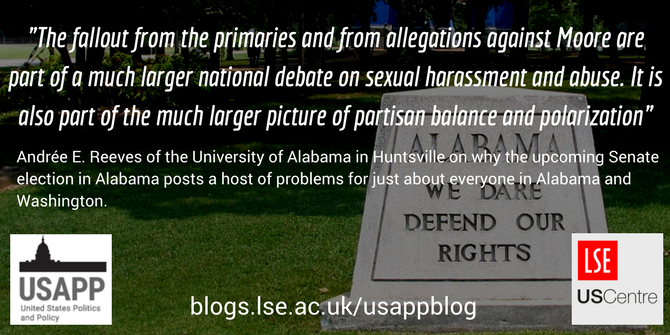 On November 9th, the Washington Post reported that allegations of past sexual misconduct had been levelled against former Alabama Chief Justice Roy Moore, who had been widely tipped to win the state’s election for the US Senate on December 12th. Andrée Reeves writes that many in the GOP establishment have condemned or distanced themselves from the already controversial Moore, who has refused to pull out of the race, while Alabama Republicans have largely maintained their support. A win for Moore’s Democratic opponent, Doug Jones, would be bad for the Republican Party, but a win for a candidate as tainted as Moore would be bad for the country as a whole.
On November 9th, the Washington Post reported that allegations of past sexual misconduct had been levelled against former Alabama Chief Justice Roy Moore, who had been widely tipped to win the state’s election for the US Senate on December 12th. Andrée Reeves writes that many in the GOP establishment have condemned or distanced themselves from the already controversial Moore, who has refused to pull out of the race, while Alabama Republicans have largely maintained their support. A win for Moore’s Democratic opponent, Doug Jones, would be bad for the Republican Party, but a win for a candidate as tainted as Moore would be bad for the country as a whole.
The old saying that “politics makes strange bedfellows” has focused Alabama’s current political drama on US Senate candidate Roy Moore. The Alabama Senate primary runoff is a national struggle in which the “direction and control of the Republican Party” are at stake. The September 26 primary runoff election dealt a direct blow to the “establishment” Republicans, both in Alabama and nationally. President Trump and Senate Majority Leader Mitch McConnell (R-KY) had thrown their support behind sitting Senator Luther Strange. But twice toppled former Alabama Supreme Court Chief Justice Roy Moore, a.k.a. “The Ten Commandments Judge,” had other ideas. In the runoff, Moore trounced Strange, who had been appointed by (now former) Governor Robert Bentley to fill the vacancy left when Senator Jeff Sessions became the US Attorney General.
Now that the contestants have been decided, the December 12 special election US Senate race in Alabama is critical to the Republicans’ two-seat majority the Senate. Alabama’s heavily Republican leanings meant that the party seemed to have little to worry about. Then, just 33 days before the election, The Washington Post dropped a bombshell from about 40 years ago. The Post reported that when Moore (now 70) was 32, he had initiated sexual contact with a 14 year old girl. Three additional women, who did not know each other and who had not voted in either the primary or the runoff, also alleged unwanted sexual advances. In the days since, a number of other women have jumped on the bandwagon, and, indeed, there may be more. Moore also allegedly was banned from the Gadsden shopping mall and a YMCA in the 1980s because of his penchant for pursuing underage girls.
Alabama’s problem has now become a national problem. It has commanded major coverage from just about every media outlet in the United States and many abroad, making the state and the country look more anti-intellectual and less competent than they do already. Currently, other than American football, the most popular sport in the state—and probably in Washington, DC—is debating election scenarios.
Election outcomes
Following a GOP primary in August which saw no candidate gain a majority, Moore won a later September runoff with 54.6 percent to Strange’s 45.4 percent. In the general election, scheduled for December 12, Moore will face Democratic candidate Doug Jones, who won his party’s nomination outright with 66 percent of the vote.
Controversies
This election would have been disruptive even without the most recent controversies. Jones, a mild-mannered former US Attorney (federal prosecutor), is best known for successfully prosecuting the killers of four young African American girls who died when the 16th Street Baptist Church was bombed in Birmingham, Alabama in 1963. The two main stated objections to Jones from Republicans are his pro-choice stance on abortion and the fact that he’s a Democrat. Often called an insurgent, the ultra-conservative Moore, on the other hand, is a former prosecutor from Etowah County, Alabama who twice was elected—and deposed—as the chief justice of the state’s Supreme Court. The first time he defied a US Supreme Court order to remove a 2.6 ton granite monument of the Ten Commandments from the judicial building. The second time he was suspended without pay for defying another US Supreme Court order by directing probate judges (who normally issue marriage licenses) in the state to enforce a statewide ban on same-sex marriages.
Alabama knew this election was going to be interesting even before Chuck Norris, Duck Dynasty’s Phil Robertson, and former vice presidential candidate Sarah Palin threw their support to Moore, who also has the backing of Trump protégé and strategist Steve Bannon.
Moore has expressed a number of attention-grabbing, controversial positions. For example, Moore has stated that the US Constitution’s First Amendment protections only apply to Christians, particularly the religion part: “Congress shall make no law respecting an establishment of religion, or prohibiting the free exercise thereof.” His views on homosexuality in general (as akin to bestiality), and gay marriage in particular, have earned the attention of the US Supreme Court. He also has opined that Muslims should not be allowed to serve in Congress. “False religions like Islam who teach that you must worship this way are completely opposite with what our First Amendment stands for.” He also has denied that former President Obama was an American citizen.
Moore’s defenders
In the wake of the Post’s allegations this month, Moore’s denials also have been subject to controversy. In an interview with a seemingly sympathetic Sean Hannity of Fox News, Moore tried to defend himself. It did not go well. Hannity asked him if he dated young girls, and Moore said, “not generally no,” adding “I don’t remember that, or dating any girl without the permission of her mother.”
And after Hannity took heat from critics—and lost some sponsors—he issued an ultimatum to Moore to explain—in 24 hours—inconsistencies in his answers to the allegations. If he didn’t explain, he should drop out of the race. Moore responded on Twitter by alleging that he had “been attacked by The Washington Post and other liberal media in a desperate attempt to smear my character and defeat my campaign.”
Some of his defenders have stirred the pot further. Alabama State Auditor Jim Zeigler said: “Take Mary and Joseph. Mary was a teenager and Joseph was an adult carpenter. They became parents of Jesus.” He ended by saying, “There’s just nothing immoral or illegal here. Maybe just a little bit unusual.” Speaking to CNN, Moore’s brother, Jerry Moore, said that the candidate “is being persecuted like Jesus Christ was.” Many of Moore’s supporters just flat out don’t believe the predator allegations. Others say his behavior was well-known around Gadsden at the time.
National Repercussions
In the wake of numerous notable allegations of sexual misconduct by some seemingly “too big to fall” titans in the entertainment industry, these allegations rocked the state. And the United States Senate. A number of prominent office-holders and others have come out in support of Moore’s accusers. Many Alabama Republicans have maintained their support for him including state Secretary of State John Merrill, who oversees elections in the state. Even prominent members of conservative news media are condemning his behavior and his candidacy. A number of senators have rescinded their endorsements or called for him to step down. Majority Leader Mitch McConnell (R-KY) has sided with the accusers. These senators would love to see someone else on the ballot. House Speaker Paul Ryan (R-WI) has called for Moore to step aside, too. The Senate this week passed a resolution calling for mandatory sexual harassment training for senators, staff, and interns—probably a good thing because accusations have since come out against Senator Al Franken (D-MN).
Senate Republicans currently hold 52 of 100 seats. Democrats have 46 plus 2 independents. Republicans desperately want to maintain or increase their majority voting strength. Under normal circumstances, they could count on Alabama as a reliable source of Republican senators. The last elected Democratic Senator from Alabama was Richard Shelby in 1992. Now Alabama’s senior senator, he switched to the Republican party the minute the Republicans won the Senate majority in 1994. Statewide elected Democrats have been few and far between ever since, although there still are a few pockets of the state that have elected some Democrats.
Nationally, Democrats have gained momentum in recent gubernatorial elections and enhanced their prospects for gains in 2018. Recently New Jersey and Virginia elected Democratic governors. Democrats will retake control of the Virginia legislature as well. They have high hopes of cutting into Republican majorities in both houses of Congress, if not of retaking control.
The dilemma for Republicans
The dilemma for the state Republicans is: do they support a hebephile or a Democrat? Apparently, in many instances, it’s not even a difficult choice. Democrats have been portrayed as the anti-Christ to many in Alabama, so voting for Doug Jones, a Democrat, for them is really not an option. Do they stick to their “Christian values” or do they tuck their tails and admit they could be wrong? Party affiliation has nothing to do with stepping over the line.
Keeping in mind that there really is no one Republican Party (or one Democratic Party). US parties comprise hundreds, if not thousands, of parties organized around states, counties, cities, towns and townships. National party committees have little control or even influence over their state and local counterparts. Ordering states to remove someone from the ballot is not an option. They can try, but in most instances the state parties will resent the intrusion and dig in.
The national party committees’ biggest resource is money. The Republican National Committee and a number of Senators have been pressuring the Alabama Republican party to dump Moore from the ticket. In response, the state party has threatened to punish Alabama officials who try to undermine or otherwise do not support Moore. Under state law, the party does not have much choice. The Secretary of State stated, “If you look at our code, then you would see that if Judge Moore disqualifies himself, or secondarily, if the Republican Party renounced his nomination, there’s no way that they can actually change the ballot.” He added that if Moore got the most votes and had either stepped down or been renounced, the election would be null and void. Then the governor would have to appoint a temporary replacement and call a new election.
“Alabama dares” by Brent Moore is licensed under CC BY NC 2.0
US Senate Republicans have a dilemma, too. Can they afford to lose that seat? And, if they win the seat with Roy Moore, will they be better off with him or without him? He is not known to “play nice with others.” One of his former law school professors wrote that “In Washington, Moore would be Senator Irrelevant, the poster child for stubborn resistance to common sense legislation….” Another professor called him “the most mixed-up person I’ve ever taught. I’m going to call [him] Fruit Salad.”
Other options that have surfaced include a write-in campaign, either for Luther Strange (the temporary senator) or for former senator (now Attorney General) Jeff Sessions, who might be looking for something else to do since he has angered the president by recusing himself from investigations of Russian involvement in our elections. Many consider that Strange, who lost to Moore in the runoff, would not have a particularly good chance of winning. The Sessions option, if successful, would make it easier for President Trump to dispense with Special counsel Robert Mueller, who is investigating Russian efforts to interfere in the 2016 presidential election since Sessions recused himself from any of the Russia dealings and thus cannot fire Mueller. If Sessions were to resign, President Trump no doubt would replace him with someone willing to fire Mueller, although given the current makeup of the Senate, confirmation might be difficult.
And Moore’s potential fellow senators have been discussing their options. Several have called on him to withdraw. Senator Cory Gardner (R-CO), the chairman of the National Republican Senatorial Committee, argued this week that if Moore “refuses to withdraw and wins, the Senate should vote to expel him.” He continued, “[h]e does not meet the ethical and moral requirements of the United States Senate.” They also have discussed not seating Moore, but that didn’t work so well 50 years ago when they tried it with Rep. Adam Clayton Powell (D-NY). And yet another scenario of questionable legality has Senator Strange stepping down and necessitating a call for a new special election. This discussion comes on the heels of a new poll conducted for the National Republican Senatorial Committee (NRSC) showing Jones leading Moore by 12 points. The NRSC recently cancelled its fundraising agreement with Moore as well.
Alabama Voters
A landline poll of likely voters conducted on November 9 and 11, 2017 gives a good illustration of who Alabama’s voters are. Fifty-two percent of likely voters approve of the job performance of President Trump, versus 41 percent who do not. But if the election were held today, 47 percent would support Democratic candidate Jones, and 45 percent would support Moore.
The JMC Analytics pollsters concluded that Moore has lost his once comfortable lead; the “slim lead Republicans had in last poll’s generic ballot tests…has vanished…; and the sexual misconduct allegations have contributed to Moore’s problems.”
Moore’s likely supporters tend to be similar to Trump voters, who carried Alabama 62-34 percent in 2016. Moore’s supporters are more likely to be over 65, white, male, and evangelical Christians, although “his support margin dropped 16 points among men and 6 points among women with leaners included.” One interesting result is that 29 percent of Moore supporters are MORE likely to vote for him after the allegations; 38 percent less likely; and 33 percent said it would not make any difference.
A recent Fox News poll has Democrat Jones ahead by 8 points, with 50 percent to 42 percent for Moore. Nine percent say they are undecided or planning to write in or vote for the libertarian candidate
Moore’s financial questions
All this drama doesn’t even touch the financial questions that face candidate Moore. In 2003, Moore established the Foundation for Moral Law after he had been removed as chief justice by a judicial discipline panel for refusing to remove his Ten Commandments monument from the state judicial building. The purpose of this charity is “educating the public and promoting current litigation aimed at moral and religious issues.” The Foundation’s board agreed to pay him $180,000 a year, comparable to his chief justice salary.
“Property, charity and tax records reviewed by The Associated Press show that the former chief justice received direct payment of $448,000 over the six years he served as president of the Foundation for Moral Law and was given a $540,000 mortgage on the charity’s building when the group said it couldn’t afford to pay his salary.” Moore’s wife, Kayla, and son, Caleb, apparently are on the payroll as well. A statement by Doug Jones says, “Once again, we see that Roy Moore has put his own interests ahead of the people of Alabama. This time, Moore misled the public and charitable donors by arranging a secret deal where he pocketed more than $1 million from his charity for part-time work.”
The Take Away
The upcoming Senate election in Alabama posts a host of problems for just about everyone in Alabama and Washington. The nation will have a problem if an unpredictable Senator hostile to the establishment wins. If Moore is elected, the state has a problem if no one takes its senator seriously. Republicans have a problem, no matter the outcome. Democrats have a problem if their candidate loses. The fallout from the primaries and from allegations against Moore are part of a much larger national debate on sexual harassment and abuse. It is also part of the much larger picture of partisan balance and polarization. The outcome of the race has us all waiting with bated breath.
Please read our comments policy before commenting.
Note: This article gives the views of the author, and not the position of USApp– American Politics and Policy, nor of the London School of Economics.
Shortened URL for this post: http://bit.ly/2Ai4cps
_________________________________
About the author
 Andrée E. Reeves – University of Alabama in Huntsville
Andrée E. Reeves – University of Alabama in Huntsville
Andrée E. Reeves, Ph.D. is an Associate Professor of Political Science at the University of Alabama in Huntsville. Her academic interests include American national institutions and politics, state and local government, intergovernmental relations, and public policy. She wrote Congressional Committee Chairmen: Three Who Made an Evolution (University Press of Kentucky, 1993) and a number of research reports and articles. Dr. Reeves earned her BA from the University of North Carolina at Chapel Hill and her MA and PhD from Rice University.







